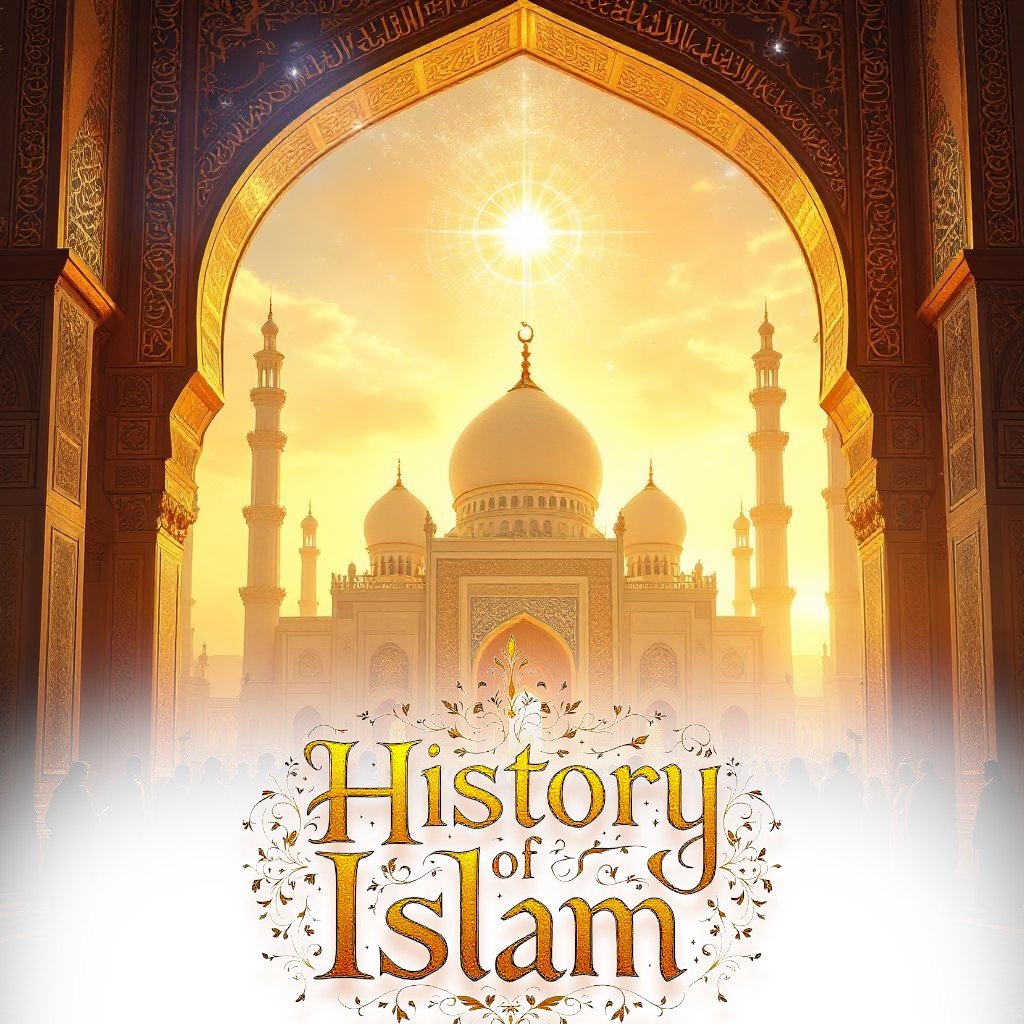🌙 Introduction
Table of Contents
ToggleThe events that are a part of the History of Islam are not just events, it’s a journey that changed humanity. The History of Islam is based on divine guidance, it contains faith, love, servitude, and belief in Allah ﷻ. Spanning over 1,400 years, Islam and its message have traveled across the globe, reaching hearts and guiding billions of individuals toward light and truth.
In the Qur’an, Allah ﷻ says,
“This day I have perfected for you your religion and completed My favor upon you and have approved for you Islam as religion.”
(Surah Al-Ma’idah, 5:3)

That divine completion is the essence of the History of Islam; it is a legacy that lives on, lighting the hearts of believers and seekers of truth.
🌟 Summary
In this blog, we will explore the History of Islam, some facts, essential beliefs, and how this belief led civilizations. We will also highlight the spiritual wisdom of Sunni Sufi scholars in their lives as examples of the beauty of Islam. No matter if you are a believer or just interested, this adventure will enliven your heart and mind.
Features of the History of Islam
1️⃣ The Divine Revelation
The History of Islam begins with the divine revelation of the Qur’an to the final Prophet, Muhammad ﷺ, over a period of 23 years. The Prophet ﷺ exemplified the perfect character, mercy, and justice.
2️⃣ The Early Believer Community
The early Muslims in Makkah and Madinah were faced with many challenges and sacrifices, and they proved how resilient faith can be. They laid the groundwork for an Islamic civilization of just, compassionate, and equitable values.
3️⃣ Expansion and Golden Age
The history of Islam featured a remarkable growth period during the ages of righteous Caliphs and later during the Umayyad and Abbasid dynasties. The Islamic Golden Age was an epoch of elevated knowledge, science, art, and spirituality.
4️⃣ Spiritual Renaissance
Sunni Sufi scholars and saints preserved the heart of Islam. Their timeless teachings have set the spiritual principles of love, humility, and devotion in motion for generations.
🌟 Tracing the Roots of Islam: Exploring the Depth and Beauty
Tracing the Roots of Islam is more than a series of events; it is a tapestry woven with belief, bravery, and the pursuit of justice and love of Allah. Our history consists of some key elements:
1️⃣ Spiritual Roots of Tawheed (One Allah)
Since the earliest days of Islam, the absolute Oneness of Allah has defined the faith. This firm belief on the part of believers gave birth to a community of submission and togetherness beyond time and beyond borders.
2️⃣ The Miraculous Prophethood of Muhammad ﷺ
At the center of A Historical Overview of Islam is the life of Muhammad ﷺ, whose mercy, wisdom, and absolute trust in Allah transformed the world. The Sunnah (traditions) of the Prophet ﷺ continues to inform the lives of every Muslim on the planet.
3️⃣ Dynamic Spread of the Message
Early Muslims were spurred by their complete belief and enthusiasm, and devoted themselves to spreading Islam far beyond Arabia. Within decades after Fat-h Mecca, Islam spread across continents in every direction, embracing cultures and peoples along the way.
4️⃣ A Civilization of Knowledge & Light
A Historical Overview of Islam is accompanied by a bright commitment to learning and scientific invention. The Golden Age of Islam produced great accomplishments in fields such as medicine, astronomy, mathematics, and literature: this period was a light of intelligence for the world.
5️⃣ Compassion and Social Justice
A Historical Overview of Islam contains many accounts of social justice and charitable behavior and compassion. Zakat (charity), respect for women, and seeking the rights of the oppressed became more than just aspects of Islamic civilization; they became elements of its ethos.
6️⃣ Sufi Wisdom & Inner Transformation
One of the less common elements of the A Historical Overview of Islam is the Sufi saints and scholars who gave their lives to purifying the heart and bringing the believer into divine love. Great individuals such as Hazrat Khwaja Gharib Nawaz, Hazrat Nizamuddin Auliya, and Hazrat Gisu Daraz inspired the hearts of individuals to seek the closeness of Allah through spiritual practices.
7️⃣ Pluralism and Tolerance
Chronicles of Islam reveals the ways in which Islam encouraged pluralism. Muslims lived alongside people of other faiths while contributing to an atmosphere of dialogue and respect—a learning that has never been more urgent in today’s world.
8️⃣ Preserving the Qur’an and Hadith
Another one of the most important features was the historical preservation of the Qur’an and Hadith literature, which enables each generation to guide halal practices by the authentic teachings of Islam.
Each of these features is a reminder of the applicability of Chronicles of Islam, which is, after all, a narrative of divine mercy and human ability.
🌙 Religion and Core Beliefs of Islam
At the heart of the History of Islam are the Five Pillars:
✅ Shahadah (Formal declaration of faith)
✅ Salah (Formal prayer)
✅ Zakah (Formal acts of charity)
✅ Sawm (Fasting during the month of Ramadan)
✅ Hajj (Pilgrimage to Makkah)
The History of Islam clarifies that the Five Pillars are not simply physical acts of worship but represent avenues for Muslims to improve spiritually and grow closer to Allah ﷻ.
🌙 Fascinating Facts About A Historical Overview of Islam
✅ Islam is the world’s fastest growing religion.
✅ The Qur’an has been preserved in exactly the same way it was revealed 1,400 years ago.
✅ Islamic civilization has contributed significantly to the fields of medicine, astronomy, mathematics, and architecture.
✅ The Islamic Historical Narrative is full of compassion, as clearly shown through the Prophet’s ﷺ approach with all of creation.
🌟 Spiritual Story of Sunni Sufi Scholars
An excellent example from an Account of Islamic History is Hazrat Khwaja Moinuddin Chishti (رحمة الله عليه), who was one of the most prominent Sunni Sufi scholars and saints. His teachings revolved around love, tolerance, and service to humanity.
Legend has it that one winter night he saw a beggar shivering in the cold, and he gave the poor man his own cloak and said:
“The true lover of Allah does not find warmth in the comforts of this world but in the warmth of love for Allah.
“This act of magnanimity and compassion illustrates the spiritual richness of The Story of Islam Through the Ages—it’s a living testament to God’s love and mercy.
🌟 Connect with Us on Social Media! 🌟
Stay inspired and join our growing community:
👉 Facebook – Discover daily updates and engage with our posts! (Syedalazhari)
👉 Instagram – Follow us for beautiful visuals and short reminders! (Syedalazhari)
👉 YouTube – Watch our educational videos and spiritual stories!
🌟 Conclusion
The Islamic heritage is one of faith, sacrifice, and divine mercy. From the deserts of Arabia to the lives of millions today, A Journey Through Islamic History is a witness to the guidance of Allah. We can learn about this history while reflecting on our own lives and hoping to be better Muslims, embodying love, knowledge, and sincerity.
“Indeed, this Qur’an guides to that which is most upright.”
(Surah Al-Isra, 17:9)
May Allah ﷻ guide us all to be adherents of the true teachings of Islam and take the light of His mercy to those around us.
💡 Related Reads:
Misconceptions About Islam – Explore common myths and learn the truth.
🌟 5 FAQs About the The Development of Islam Over Time
1️⃣ Where is the starting point of The History of Islam?
The starting point of The Milestones in Islamic History is the Qur’an being revealed to the Prophet Muhammad ﷺ in 610 CE in Makkah. This revelation signaled the start of a new age of divine guidance for humanity.
2️⃣ Who are the key people in early Islamic history?
Key people include the Prophet ﷺ, the four rightly guided Caliphs (Abu Bakr, Umar, Uthman, Ali), and those Sunni Sufi scholars and teachers we revere today as authentic representatives of Islam: Imam Al-Ghazali, Khwaja Moinuddin Chishti, Khwaja Bandanawa Gesudaraz RH and many others.
3️⃣ How did Islam spread?
Islam spread through preaching peacefully, through trade, and spiritual influence. Foundations and Growth of Islam tells us that it was the strength of character and integrity of people which has inspired many individuals to become people of faith.
4️⃣ What are the main teachings of Islam?
The main teachings of Islam are consistent messages of monotheism, justice, compassion, and service to humanity. The Historical Emergence and Expansion of Islam shows these teachings which are alive in every age.
5️⃣ How does the The History of Islam inspire us today?
The Evolution of Islamic Civilization inspires us to live lives of faith, patience and purpose. It reminds us that every challenge is an opportunity for us to get closer to Allah ﷻ, and reflect His mercy.
Connect with Us on the Path of Knowledge & Light
Are you ready to embark on a journey of Islamic learning and spiritual growth? Please reach out.




